Legal Advice Report for Monica: Contract, Employment, and Company Law
VerifiedAdded on 2021/01/02
|13
|3729
|233
Report
AI Summary
This report provides legal advice to Monica, addressing several key areas of law. It begins by defining representation in contract law and differentiating it from contractual terms, analyzing a case involving a car purchase and potential misrepresentation. The report then explores the grounds for unfair dismissal in employment law, outlining fair reasons for dismissal and situations that constitute unfair dismissal, along with the required dismissal process. Finally, it explains the duties of company directors, referencing the Companies Act 2006 and emphasizing their responsibilities to act in the company's best interest and promote its success. The report concludes by summarizing the key legal principles discussed and offering practical guidance.

LAW
Paraphrase This Document
Need a fresh take? Get an instant paraphrase of this document with our AI Paraphraser
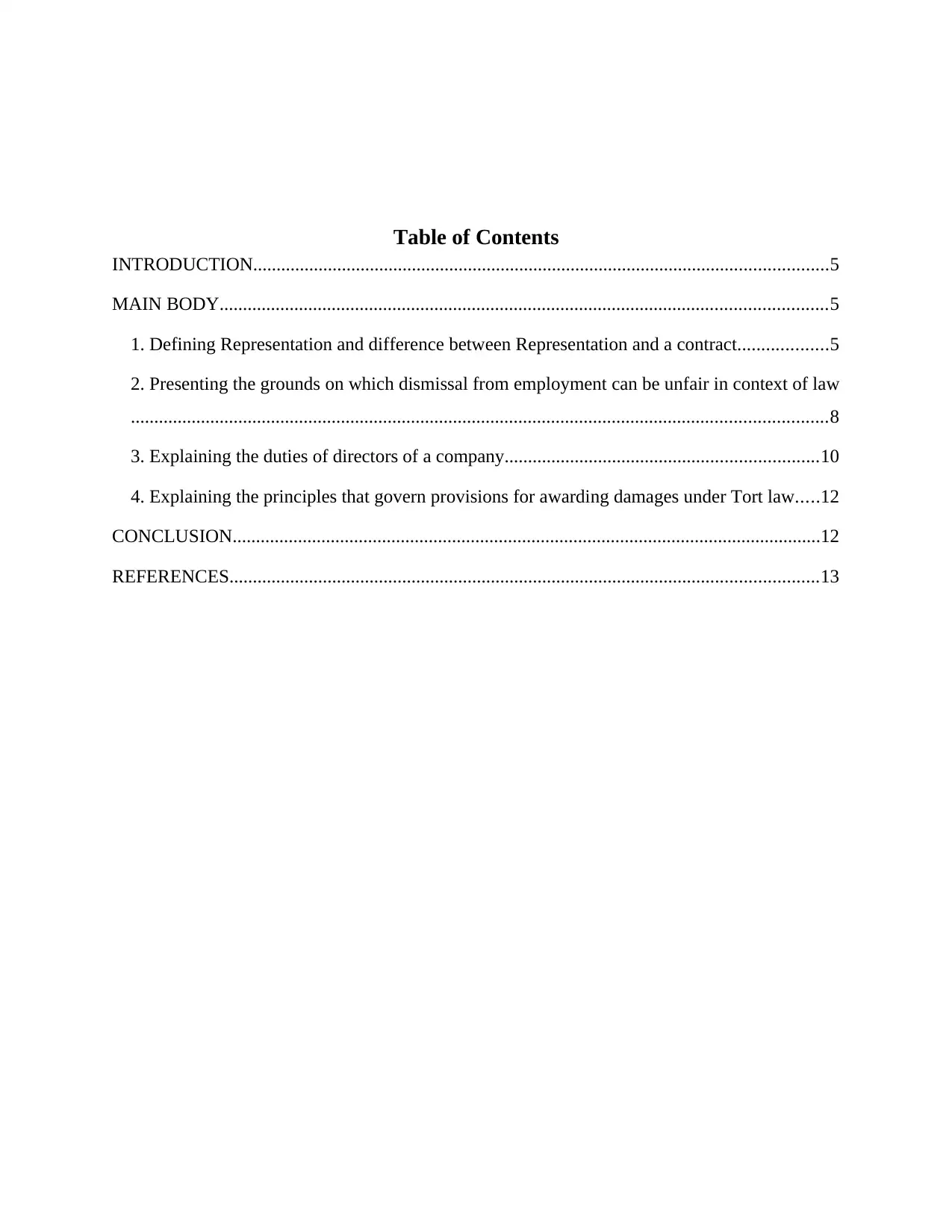
Table of Contents
INTRODUCTION...........................................................................................................................5
MAIN BODY..................................................................................................................................5
1. Defining Representation and difference between Representation and a contract...................5
2. Presenting the grounds on which dismissal from employment can be unfair in context of law
.....................................................................................................................................................8
3. Explaining the duties of directors of a company...................................................................10
4. Explaining the principles that govern provisions for awarding damages under Tort law.....12
CONCLUSION..............................................................................................................................12
REFERENCES..............................................................................................................................13
INTRODUCTION...........................................................................................................................5
MAIN BODY..................................................................................................................................5
1. Defining Representation and difference between Representation and a contract...................5
2. Presenting the grounds on which dismissal from employment can be unfair in context of law
.....................................................................................................................................................8
3. Explaining the duties of directors of a company...................................................................10
4. Explaining the principles that govern provisions for awarding damages under Tort law.....12
CONCLUSION..............................................................................................................................12
REFERENCES..............................................................................................................................13
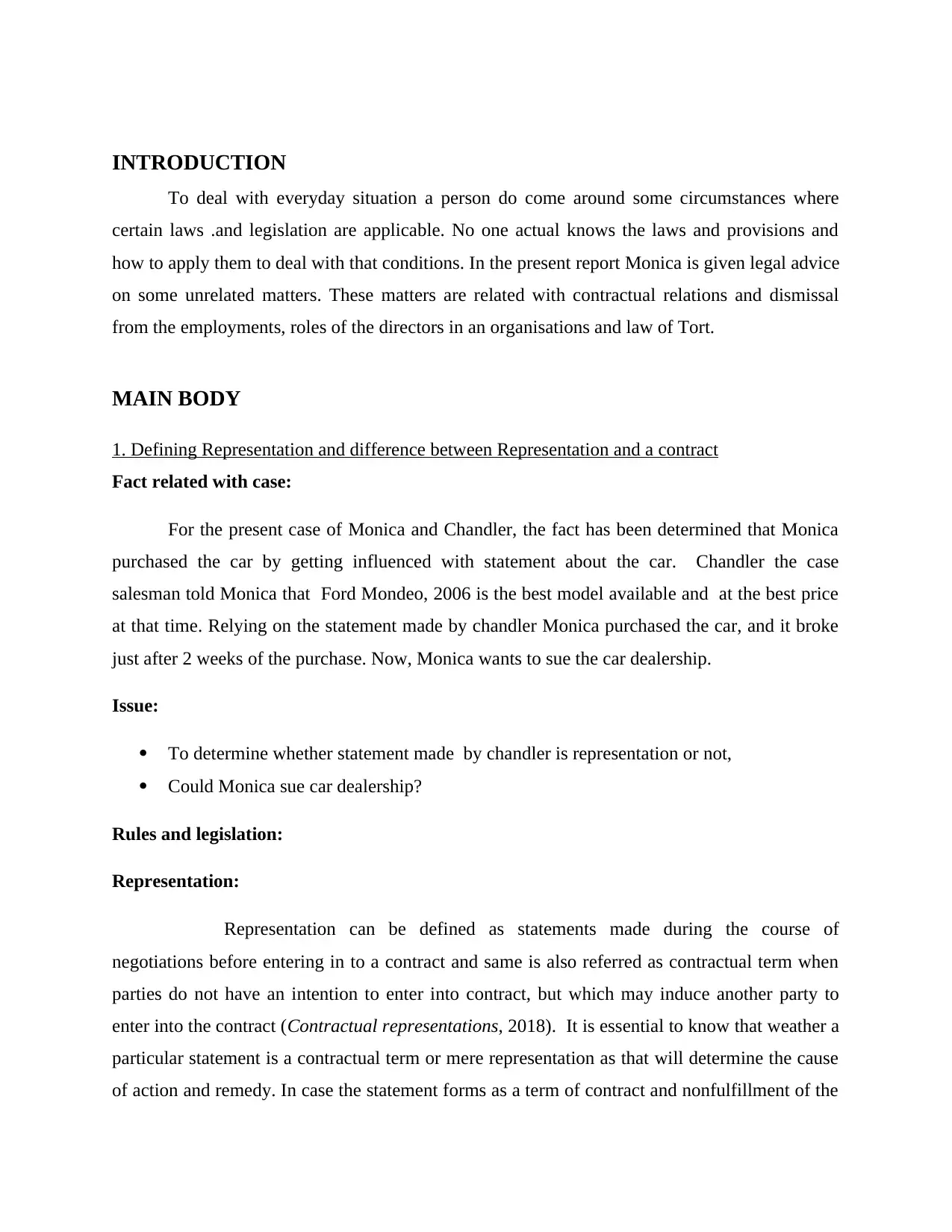
INTRODUCTION
To deal with everyday situation a person do come around some circumstances where
certain laws .and legislation are applicable. No one actual knows the laws and provisions and
how to apply them to deal with that conditions. In the present report Monica is given legal advice
on some unrelated matters. These matters are related with contractual relations and dismissal
from the employments, roles of the directors in an organisations and law of Tort.
MAIN BODY
1. Defining Representation and difference between Representation and a contract
Fact related with case:
For the present case of Monica and Chandler, the fact has been determined that Monica
purchased the car by getting influenced with statement about the car. Chandler the case
salesman told Monica that Ford Mondeo, 2006 is the best model available and at the best price
at that time. Relying on the statement made by chandler Monica purchased the car, and it broke
just after 2 weeks of the purchase. Now, Monica wants to sue the car dealership.
Issue:
To determine whether statement made by chandler is representation or not,
Could Monica sue car dealership?
Rules and legislation:
Representation:
Representation can be defined as statements made during the course of
negotiations before entering in to a contract and same is also referred as contractual term when
parties do not have an intention to enter into contract, but which may induce another party to
enter into the contract (Contractual representations, 2018). It is essential to know that weather a
particular statement is a contractual term or mere representation as that will determine the cause
of action and remedy. In case the statement forms as a term of contract and nonfulfillment of the
To deal with everyday situation a person do come around some circumstances where
certain laws .and legislation are applicable. No one actual knows the laws and provisions and
how to apply them to deal with that conditions. In the present report Monica is given legal advice
on some unrelated matters. These matters are related with contractual relations and dismissal
from the employments, roles of the directors in an organisations and law of Tort.
MAIN BODY
1. Defining Representation and difference between Representation and a contract
Fact related with case:
For the present case of Monica and Chandler, the fact has been determined that Monica
purchased the car by getting influenced with statement about the car. Chandler the case
salesman told Monica that Ford Mondeo, 2006 is the best model available and at the best price
at that time. Relying on the statement made by chandler Monica purchased the car, and it broke
just after 2 weeks of the purchase. Now, Monica wants to sue the car dealership.
Issue:
To determine whether statement made by chandler is representation or not,
Could Monica sue car dealership?
Rules and legislation:
Representation:
Representation can be defined as statements made during the course of
negotiations before entering in to a contract and same is also referred as contractual term when
parties do not have an intention to enter into contract, but which may induce another party to
enter into the contract (Contractual representations, 2018). It is essential to know that weather a
particular statement is a contractual term or mere representation as that will determine the cause
of action and remedy. In case the statement forms as a term of contract and nonfulfillment of the
⊘ This is a preview!⊘
Do you want full access?
Subscribe today to unlock all pages.

Trusted by 1+ million students worldwide
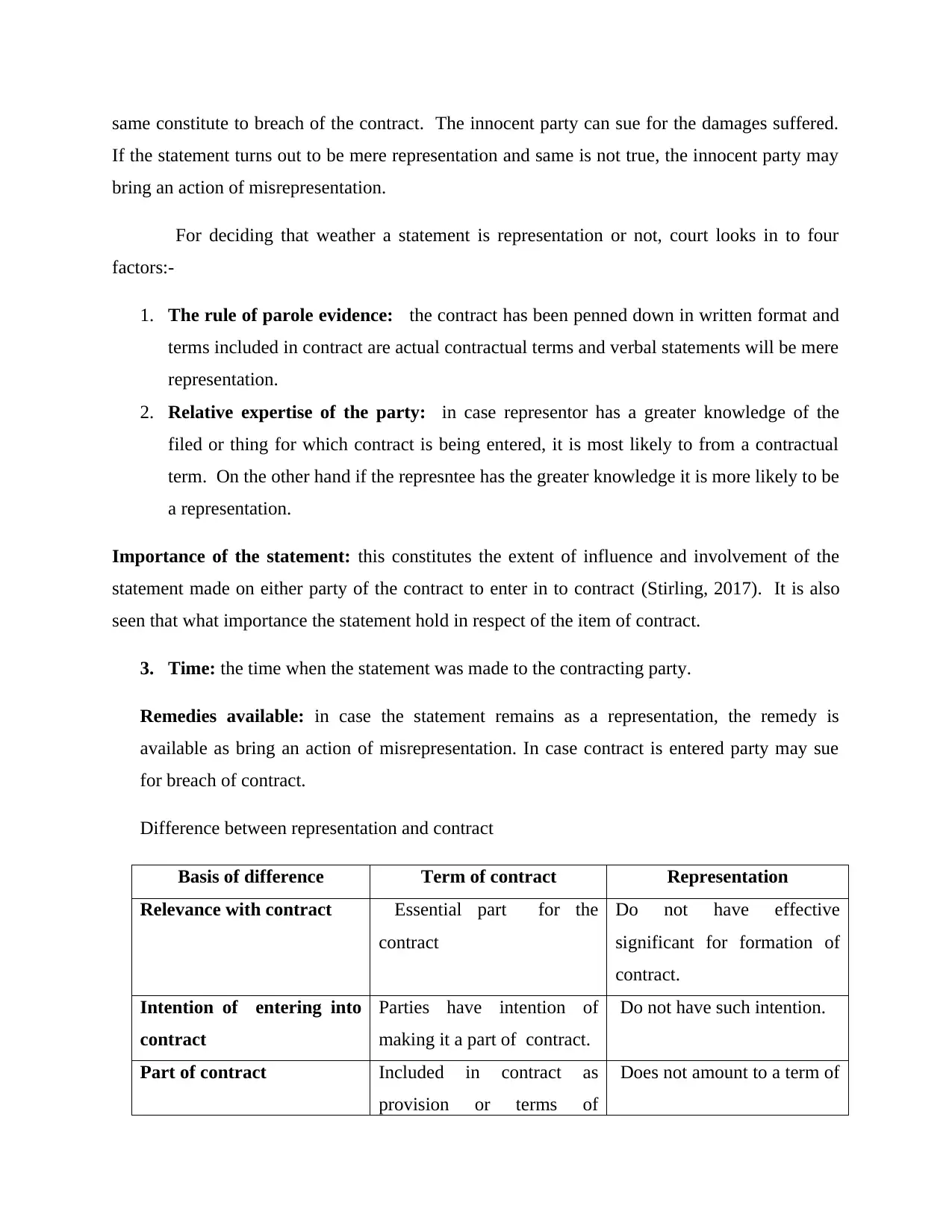
same constitute to breach of the contract. The innocent party can sue for the damages suffered.
If the statement turns out to be mere representation and same is not true, the innocent party may
bring an action of misrepresentation.
For deciding that weather a statement is representation or not, court looks in to four
factors:-
1. The rule of parole evidence: the contract has been penned down in written format and
terms included in contract are actual contractual terms and verbal statements will be mere
representation.
2. Relative expertise of the party: in case representor has a greater knowledge of the
filed or thing for which contract is being entered, it is most likely to from a contractual
term. On the other hand if the represntee has the greater knowledge it is more likely to be
a representation.
Importance of the statement: this constitutes the extent of influence and involvement of the
statement made on either party of the contract to enter in to contract (Stirling, 2017). It is also
seen that what importance the statement hold in respect of the item of contract.
3. Time: the time when the statement was made to the contracting party.
Remedies available: in case the statement remains as a representation, the remedy is
available as bring an action of misrepresentation. In case contract is entered party may sue
for breach of contract.
Difference between representation and contract
Basis of difference Term of contract Representation
Relevance with contract Essential part for the
contract
Do not have effective
significant for formation of
contract.
Intention of entering into
contract
Parties have intention of
making it a part of contract.
Do not have such intention.
Part of contract Included in contract as
provision or terms of
Does not amount to a term of
If the statement turns out to be mere representation and same is not true, the innocent party may
bring an action of misrepresentation.
For deciding that weather a statement is representation or not, court looks in to four
factors:-
1. The rule of parole evidence: the contract has been penned down in written format and
terms included in contract are actual contractual terms and verbal statements will be mere
representation.
2. Relative expertise of the party: in case representor has a greater knowledge of the
filed or thing for which contract is being entered, it is most likely to from a contractual
term. On the other hand if the represntee has the greater knowledge it is more likely to be
a representation.
Importance of the statement: this constitutes the extent of influence and involvement of the
statement made on either party of the contract to enter in to contract (Stirling, 2017). It is also
seen that what importance the statement hold in respect of the item of contract.
3. Time: the time when the statement was made to the contracting party.
Remedies available: in case the statement remains as a representation, the remedy is
available as bring an action of misrepresentation. In case contract is entered party may sue
for breach of contract.
Difference between representation and contract
Basis of difference Term of contract Representation
Relevance with contract Essential part for the
contract
Do not have effective
significant for formation of
contract.
Intention of entering into
contract
Parties have intention of
making it a part of contract.
Do not have such intention.
Part of contract Included in contract as
provision or terms of
Does not amount to a term of
Paraphrase This Document
Need a fresh take? Get an instant paraphrase of this document with our AI Paraphraser
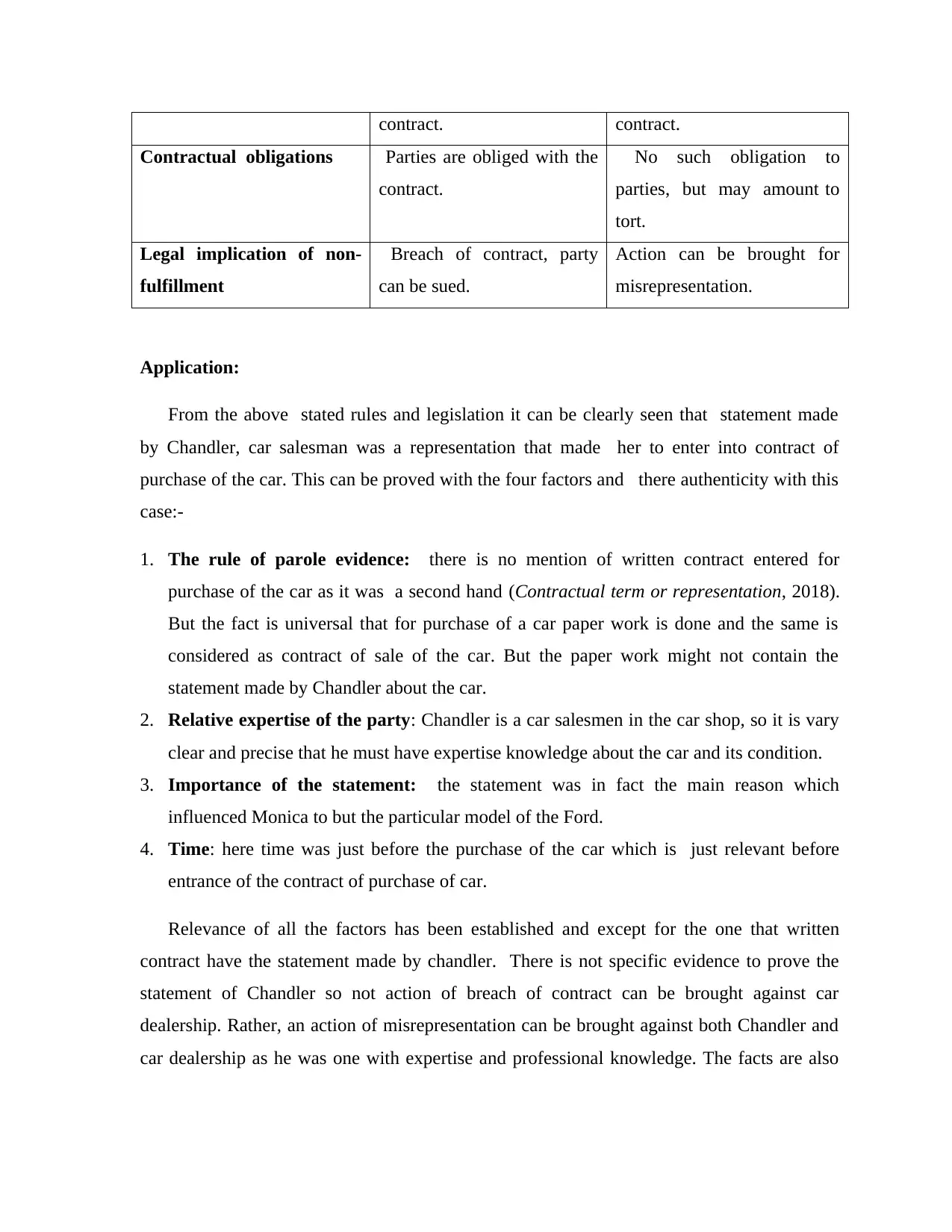
contract. contract.
Contractual obligations Parties are obliged with the
contract.
No such obligation to
parties, but may amount to
tort.
Legal implication of non-
fulfillment
Breach of contract, party
can be sued.
Action can be brought for
misrepresentation.
Application:
From the above stated rules and legislation it can be clearly seen that statement made
by Chandler, car salesman was a representation that made her to enter into contract of
purchase of the car. This can be proved with the four factors and there authenticity with this
case:-
1. The rule of parole evidence: there is no mention of written contract entered for
purchase of the car as it was a second hand (Contractual term or representation, 2018).
But the fact is universal that for purchase of a car paper work is done and the same is
considered as contract of sale of the car. But the paper work might not contain the
statement made by Chandler about the car.
2. Relative expertise of the party: Chandler is a car salesmen in the car shop, so it is vary
clear and precise that he must have expertise knowledge about the car and its condition.
3. Importance of the statement: the statement was in fact the main reason which
influenced Monica to but the particular model of the Ford.
4. Time: here time was just before the purchase of the car which is just relevant before
entrance of the contract of purchase of car.
Relevance of all the factors has been established and except for the one that written
contract have the statement made by chandler. There is not specific evidence to prove the
statement of Chandler so not action of breach of contract can be brought against car
dealership. Rather, an action of misrepresentation can be brought against both Chandler and
car dealership as he was one with expertise and professional knowledge. The facts are also
Contractual obligations Parties are obliged with the
contract.
No such obligation to
parties, but may amount to
tort.
Legal implication of non-
fulfillment
Breach of contract, party
can be sued.
Action can be brought for
misrepresentation.
Application:
From the above stated rules and legislation it can be clearly seen that statement made
by Chandler, car salesman was a representation that made her to enter into contract of
purchase of the car. This can be proved with the four factors and there authenticity with this
case:-
1. The rule of parole evidence: there is no mention of written contract entered for
purchase of the car as it was a second hand (Contractual term or representation, 2018).
But the fact is universal that for purchase of a car paper work is done and the same is
considered as contract of sale of the car. But the paper work might not contain the
statement made by Chandler about the car.
2. Relative expertise of the party: Chandler is a car salesmen in the car shop, so it is vary
clear and precise that he must have expertise knowledge about the car and its condition.
3. Importance of the statement: the statement was in fact the main reason which
influenced Monica to but the particular model of the Ford.
4. Time: here time was just before the purchase of the car which is just relevant before
entrance of the contract of purchase of car.
Relevance of all the factors has been established and except for the one that written
contract have the statement made by chandler. There is not specific evidence to prove the
statement of Chandler so not action of breach of contract can be brought against car
dealership. Rather, an action of misrepresentation can be brought against both Chandler and
car dealership as he was one with expertise and professional knowledge. The facts are also
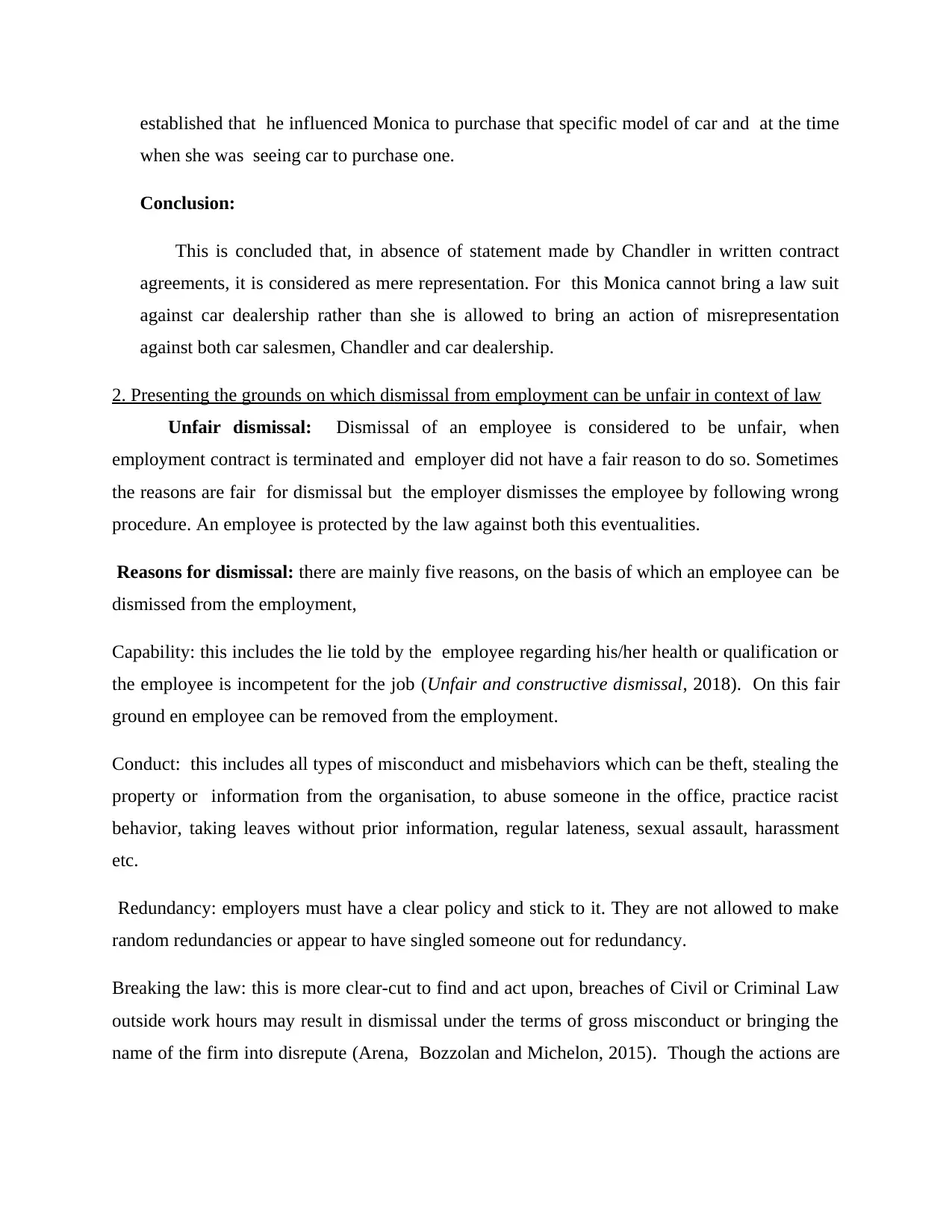
established that he influenced Monica to purchase that specific model of car and at the time
when she was seeing car to purchase one.
Conclusion:
This is concluded that, in absence of statement made by Chandler in written contract
agreements, it is considered as mere representation. For this Monica cannot bring a law suit
against car dealership rather than she is allowed to bring an action of misrepresentation
against both car salesmen, Chandler and car dealership.
2. Presenting the grounds on which dismissal from employment can be unfair in context of law
Unfair dismissal: Dismissal of an employee is considered to be unfair, when
employment contract is terminated and employer did not have a fair reason to do so. Sometimes
the reasons are fair for dismissal but the employer dismisses the employee by following wrong
procedure. An employee is protected by the law against both this eventualities.
Reasons for dismissal: there are mainly five reasons, on the basis of which an employee can be
dismissed from the employment,
Capability: this includes the lie told by the employee regarding his/her health or qualification or
the employee is incompetent for the job (Unfair and constructive dismissal, 2018). On this fair
ground en employee can be removed from the employment.
Conduct: this includes all types of misconduct and misbehaviors which can be theft, stealing the
property or information from the organisation, to abuse someone in the office, practice racist
behavior, taking leaves without prior information, regular lateness, sexual assault, harassment
etc.
Redundancy: employers must have a clear policy and stick to it. They are not allowed to make
random redundancies or appear to have singled someone out for redundancy.
Breaking the law: this is more clear-cut to find and act upon, breaches of Civil or Criminal Law
outside work hours may result in dismissal under the terms of gross misconduct or bringing the
name of the firm into disrepute (Arena, Bozzolan and Michelon, 2015). Though the actions are
when she was seeing car to purchase one.
Conclusion:
This is concluded that, in absence of statement made by Chandler in written contract
agreements, it is considered as mere representation. For this Monica cannot bring a law suit
against car dealership rather than she is allowed to bring an action of misrepresentation
against both car salesmen, Chandler and car dealership.
2. Presenting the grounds on which dismissal from employment can be unfair in context of law
Unfair dismissal: Dismissal of an employee is considered to be unfair, when
employment contract is terminated and employer did not have a fair reason to do so. Sometimes
the reasons are fair for dismissal but the employer dismisses the employee by following wrong
procedure. An employee is protected by the law against both this eventualities.
Reasons for dismissal: there are mainly five reasons, on the basis of which an employee can be
dismissed from the employment,
Capability: this includes the lie told by the employee regarding his/her health or qualification or
the employee is incompetent for the job (Unfair and constructive dismissal, 2018). On this fair
ground en employee can be removed from the employment.
Conduct: this includes all types of misconduct and misbehaviors which can be theft, stealing the
property or information from the organisation, to abuse someone in the office, practice racist
behavior, taking leaves without prior information, regular lateness, sexual assault, harassment
etc.
Redundancy: employers must have a clear policy and stick to it. They are not allowed to make
random redundancies or appear to have singled someone out for redundancy.
Breaking the law: this is more clear-cut to find and act upon, breaches of Civil or Criminal Law
outside work hours may result in dismissal under the terms of gross misconduct or bringing the
name of the firm into disrepute (Arena, Bozzolan and Michelon, 2015). Though the actions are
⊘ This is a preview!⊘
Do you want full access?
Subscribe today to unlock all pages.

Trusted by 1+ million students worldwide
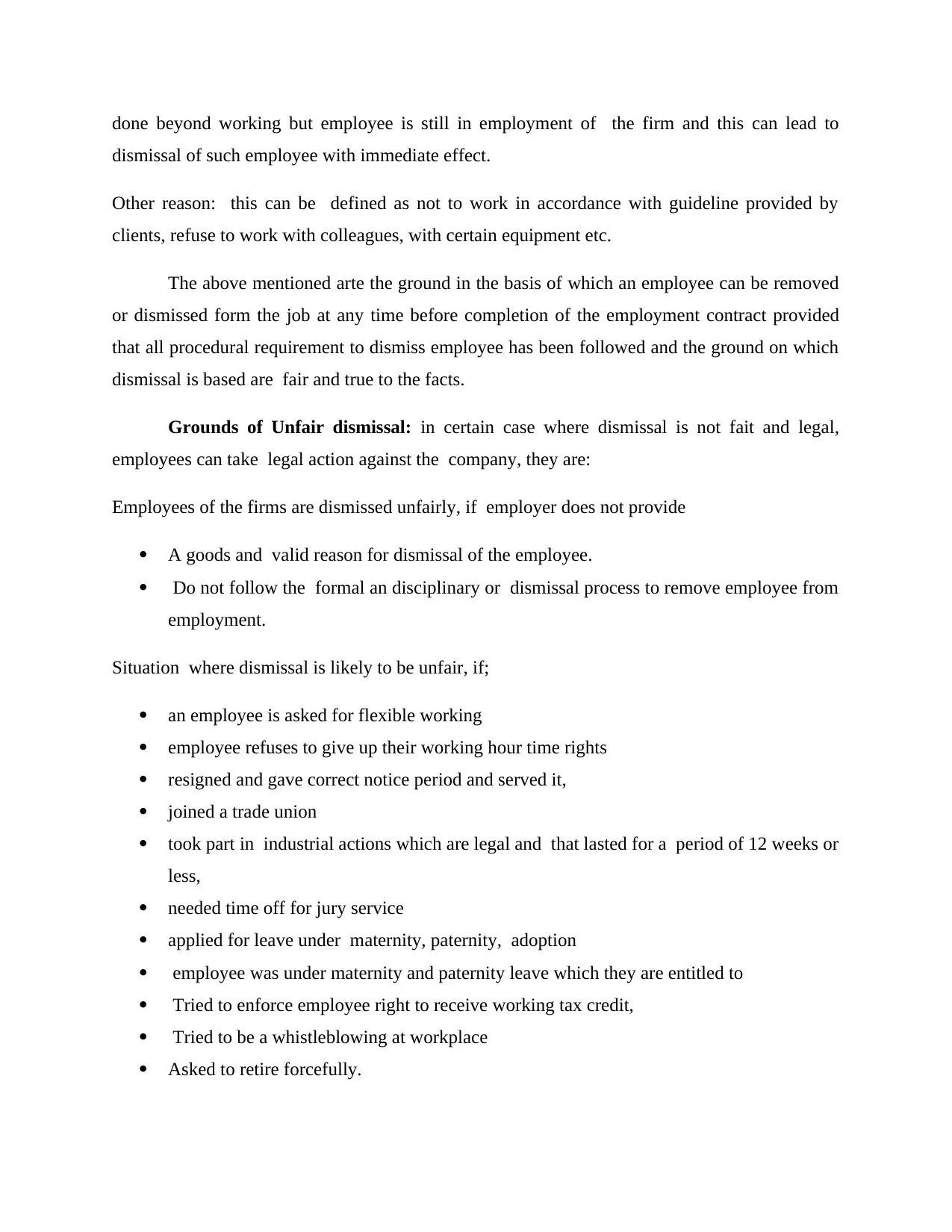
done beyond working but employee is still in employment of the firm and this can lead to
dismissal of such employee with immediate effect.
Other reason: this can be defined as not to work in accordance with guideline provided by
clients, refuse to work with colleagues, with certain equipment etc.
The above mentioned arte the ground in the basis of which an employee can be removed
or dismissed form the job at any time before completion of the employment contract provided
that all procedural requirement to dismiss employee has been followed and the ground on which
dismissal is based are fair and true to the facts.
Grounds of Unfair dismissal: in certain case where dismissal is not fait and legal,
employees can take legal action against the company, they are:
Employees of the firms are dismissed unfairly, if employer does not provide
A goods and valid reason for dismissal of the employee.
Do not follow the formal an disciplinary or dismissal process to remove employee from
employment.
Situation where dismissal is likely to be unfair, if;
an employee is asked for flexible working
employee refuses to give up their working hour time rights
resigned and gave correct notice period and served it,
joined a trade union
took part in industrial actions which are legal and that lasted for a period of 12 weeks or
less,
needed time off for jury service
applied for leave under maternity, paternity, adoption
employee was under maternity and paternity leave which they are entitled to
Tried to enforce employee right to receive working tax credit,
Tried to be a whistleblowing at workplace
Asked to retire forcefully.
dismissal of such employee with immediate effect.
Other reason: this can be defined as not to work in accordance with guideline provided by
clients, refuse to work with colleagues, with certain equipment etc.
The above mentioned arte the ground in the basis of which an employee can be removed
or dismissed form the job at any time before completion of the employment contract provided
that all procedural requirement to dismiss employee has been followed and the ground on which
dismissal is based are fair and true to the facts.
Grounds of Unfair dismissal: in certain case where dismissal is not fait and legal,
employees can take legal action against the company, they are:
Employees of the firms are dismissed unfairly, if employer does not provide
A goods and valid reason for dismissal of the employee.
Do not follow the formal an disciplinary or dismissal process to remove employee from
employment.
Situation where dismissal is likely to be unfair, if;
an employee is asked for flexible working
employee refuses to give up their working hour time rights
resigned and gave correct notice period and served it,
joined a trade union
took part in industrial actions which are legal and that lasted for a period of 12 weeks or
less,
needed time off for jury service
applied for leave under maternity, paternity, adoption
employee was under maternity and paternity leave which they are entitled to
Tried to enforce employee right to receive working tax credit,
Tried to be a whistleblowing at workplace
Asked to retire forcefully.
Paraphrase This Document
Need a fresh take? Get an instant paraphrase of this document with our AI Paraphraser
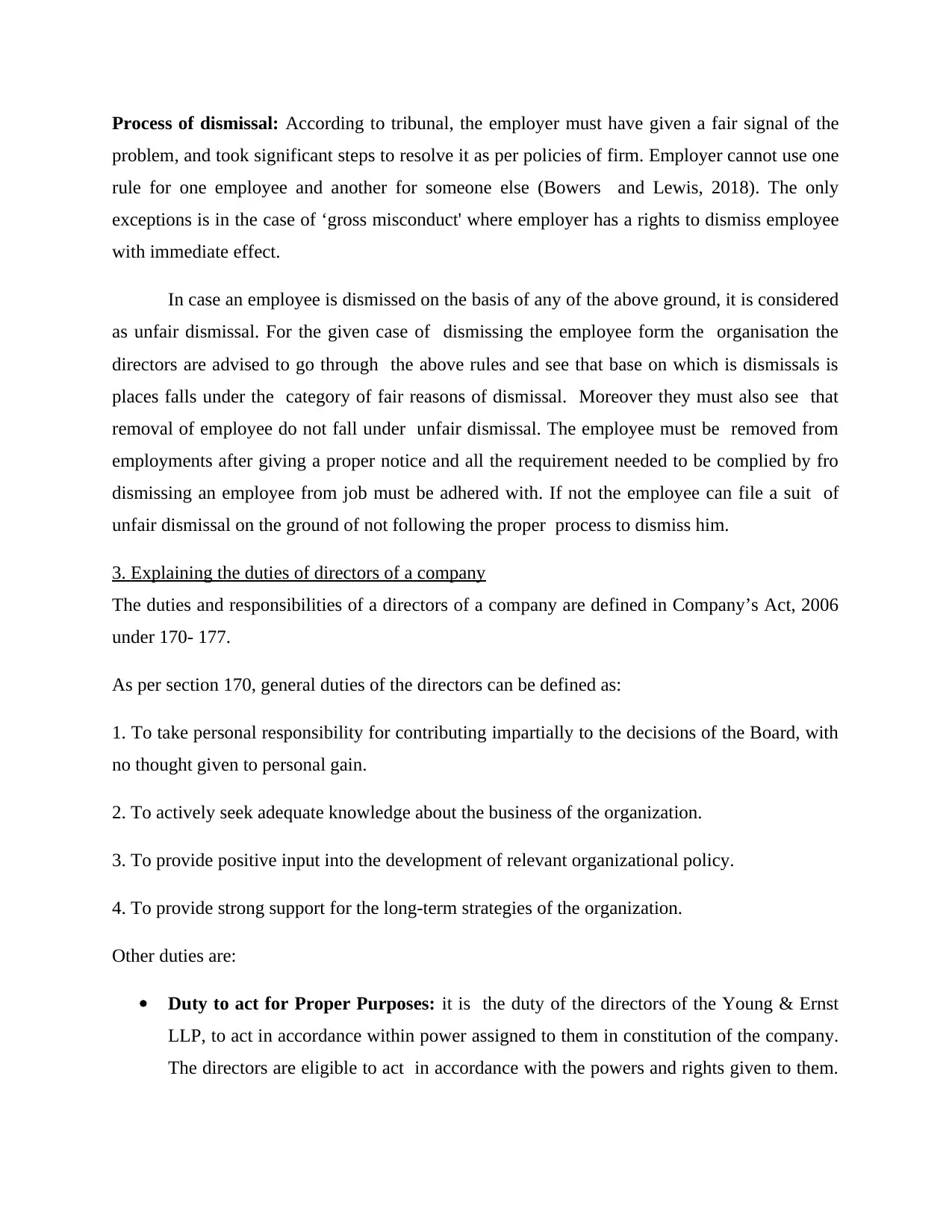
Process of dismissal: According to tribunal, the employer must have given a fair signal of the
problem, and took significant steps to resolve it as per policies of firm. Employer cannot use one
rule for one employee and another for someone else (Bowers and Lewis, 2018). The only
exceptions is in the case of ‘gross misconduct' where employer has a rights to dismiss employee
with immediate effect.
In case an employee is dismissed on the basis of any of the above ground, it is considered
as unfair dismissal. For the given case of dismissing the employee form the organisation the
directors are advised to go through the above rules and see that base on which is dismissals is
places falls under the category of fair reasons of dismissal. Moreover they must also see that
removal of employee do not fall under unfair dismissal. The employee must be removed from
employments after giving a proper notice and all the requirement needed to be complied by fro
dismissing an employee from job must be adhered with. If not the employee can file a suit of
unfair dismissal on the ground of not following the proper process to dismiss him.
3. Explaining the duties of directors of a company
The duties and responsibilities of a directors of a company are defined in Company’s Act, 2006
under 170- 177.
As per section 170, general duties of the directors can be defined as:
1. To take personal responsibility for contributing impartially to the decisions of the Board, with
no thought given to personal gain.
2. To actively seek adequate knowledge about the business of the organization.
3. To provide positive input into the development of relevant organizational policy.
4. To provide strong support for the long-term strategies of the organization.
Other duties are:
Duty to act for Proper Purposes: it is the duty of the directors of the Young & Ernst
LLP, to act in accordance within power assigned to them in constitution of the company.
The directors are eligible to act in accordance with the powers and rights given to them.
problem, and took significant steps to resolve it as per policies of firm. Employer cannot use one
rule for one employee and another for someone else (Bowers and Lewis, 2018). The only
exceptions is in the case of ‘gross misconduct' where employer has a rights to dismiss employee
with immediate effect.
In case an employee is dismissed on the basis of any of the above ground, it is considered
as unfair dismissal. For the given case of dismissing the employee form the organisation the
directors are advised to go through the above rules and see that base on which is dismissals is
places falls under the category of fair reasons of dismissal. Moreover they must also see that
removal of employee do not fall under unfair dismissal. The employee must be removed from
employments after giving a proper notice and all the requirement needed to be complied by fro
dismissing an employee from job must be adhered with. If not the employee can file a suit of
unfair dismissal on the ground of not following the proper process to dismiss him.
3. Explaining the duties of directors of a company
The duties and responsibilities of a directors of a company are defined in Company’s Act, 2006
under 170- 177.
As per section 170, general duties of the directors can be defined as:
1. To take personal responsibility for contributing impartially to the decisions of the Board, with
no thought given to personal gain.
2. To actively seek adequate knowledge about the business of the organization.
3. To provide positive input into the development of relevant organizational policy.
4. To provide strong support for the long-term strategies of the organization.
Other duties are:
Duty to act for Proper Purposes: it is the duty of the directors of the Young & Ernst
LLP, to act in accordance within power assigned to them in constitution of the company.
The directors are eligible to act in accordance with the powers and rights given to them.
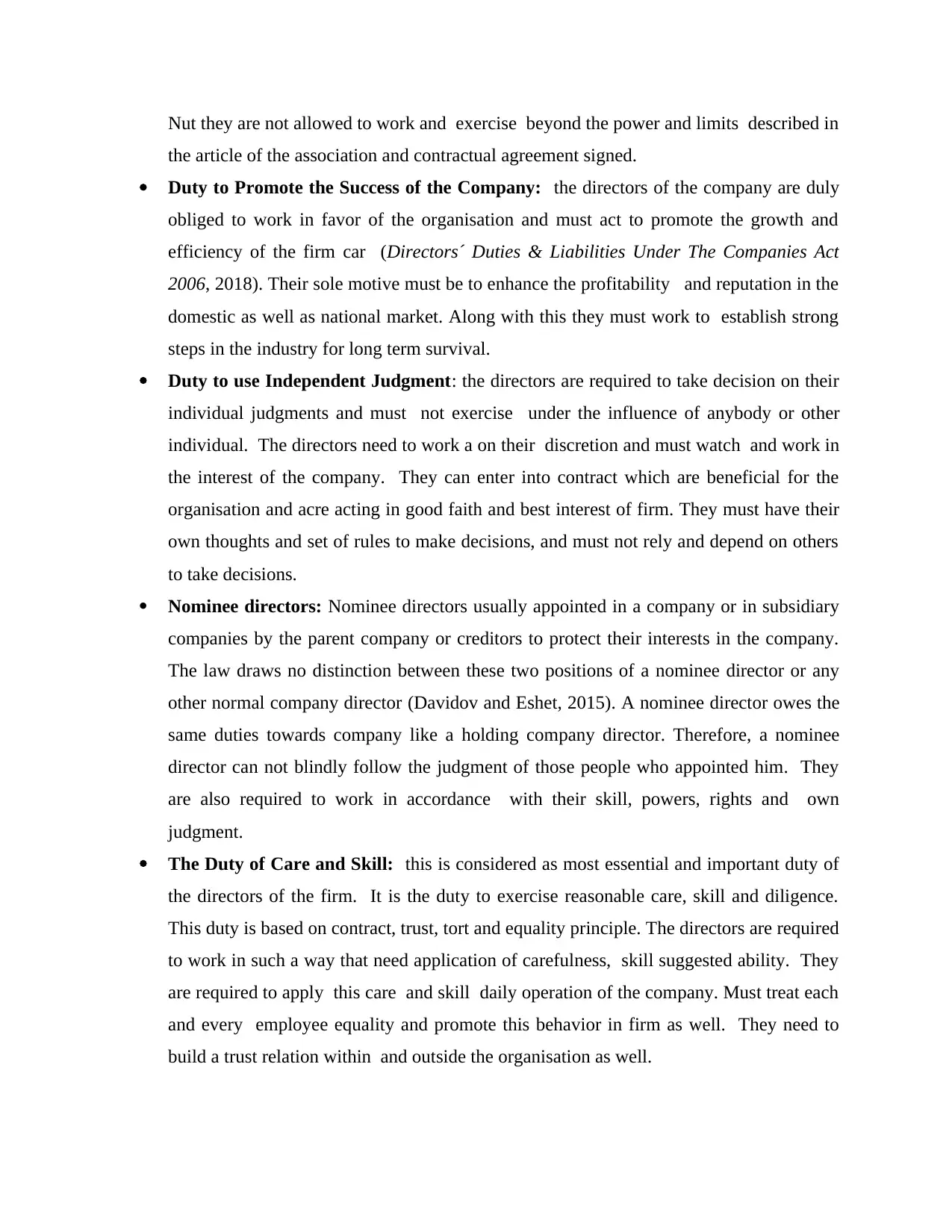
Nut they are not allowed to work and exercise beyond the power and limits described in
the article of the association and contractual agreement signed.
Duty to Promote the Success of the Company: the directors of the company are duly
obliged to work in favor of the organisation and must act to promote the growth and
efficiency of the firm car (Directors´ Duties & Liabilities Under The Companies Act
2006, 2018). Their sole motive must be to enhance the profitability and reputation in the
domestic as well as national market. Along with this they must work to establish strong
steps in the industry for long term survival.
Duty to use Independent Judgment: the directors are required to take decision on their
individual judgments and must not exercise under the influence of anybody or other
individual. The directors need to work a on their discretion and must watch and work in
the interest of the company. They can enter into contract which are beneficial for the
organisation and acre acting in good faith and best interest of firm. They must have their
own thoughts and set of rules to make decisions, and must not rely and depend on others
to take decisions.
Nominee directors: Nominee directors usually appointed in a company or in subsidiary
companies by the parent company or creditors to protect their interests in the company.
The law draws no distinction between these two positions of a nominee director or any
other normal company director (Davidov and Eshet, 2015). A nominee director owes the
same duties towards company like a holding company director. Therefore, a nominee
director can not blindly follow the judgment of those people who appointed him. They
are also required to work in accordance with their skill, powers, rights and own
judgment.
The Duty of Care and Skill: this is considered as most essential and important duty of
the directors of the firm. It is the duty to exercise reasonable care, skill and diligence.
This duty is based on contract, trust, tort and equality principle. The directors are required
to work in such a way that need application of carefulness, skill suggested ability. They
are required to apply this care and skill daily operation of the company. Must treat each
and every employee equality and promote this behavior in firm as well. They need to
build a trust relation within and outside the organisation as well.
the article of the association and contractual agreement signed.
Duty to Promote the Success of the Company: the directors of the company are duly
obliged to work in favor of the organisation and must act to promote the growth and
efficiency of the firm car (Directors´ Duties & Liabilities Under The Companies Act
2006, 2018). Their sole motive must be to enhance the profitability and reputation in the
domestic as well as national market. Along with this they must work to establish strong
steps in the industry for long term survival.
Duty to use Independent Judgment: the directors are required to take decision on their
individual judgments and must not exercise under the influence of anybody or other
individual. The directors need to work a on their discretion and must watch and work in
the interest of the company. They can enter into contract which are beneficial for the
organisation and acre acting in good faith and best interest of firm. They must have their
own thoughts and set of rules to make decisions, and must not rely and depend on others
to take decisions.
Nominee directors: Nominee directors usually appointed in a company or in subsidiary
companies by the parent company or creditors to protect their interests in the company.
The law draws no distinction between these two positions of a nominee director or any
other normal company director (Davidov and Eshet, 2015). A nominee director owes the
same duties towards company like a holding company director. Therefore, a nominee
director can not blindly follow the judgment of those people who appointed him. They
are also required to work in accordance with their skill, powers, rights and own
judgment.
The Duty of Care and Skill: this is considered as most essential and important duty of
the directors of the firm. It is the duty to exercise reasonable care, skill and diligence.
This duty is based on contract, trust, tort and equality principle. The directors are required
to work in such a way that need application of carefulness, skill suggested ability. They
are required to apply this care and skill daily operation of the company. Must treat each
and every employee equality and promote this behavior in firm as well. They need to
build a trust relation within and outside the organisation as well.
⊘ This is a preview!⊘
Do you want full access?
Subscribe today to unlock all pages.

Trusted by 1+ million students worldwide
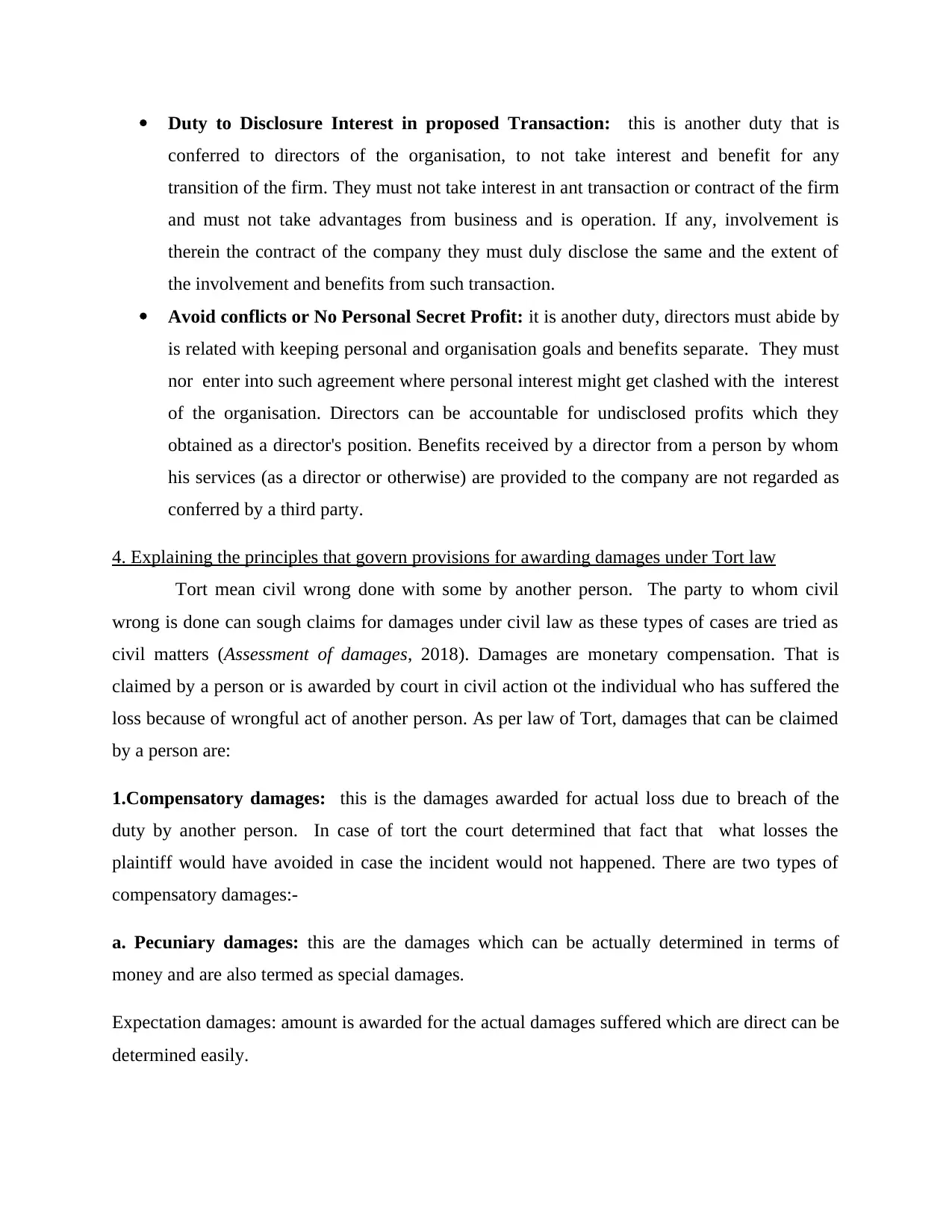
Duty to Disclosure Interest in proposed Transaction: this is another duty that is
conferred to directors of the organisation, to not take interest and benefit for any
transition of the firm. They must not take interest in ant transaction or contract of the firm
and must not take advantages from business and is operation. If any, involvement is
therein the contract of the company they must duly disclose the same and the extent of
the involvement and benefits from such transaction.
Avoid conflicts or No Personal Secret Profit: it is another duty, directors must abide by
is related with keeping personal and organisation goals and benefits separate. They must
nor enter into such agreement where personal interest might get clashed with the interest
of the organisation. Directors can be accountable for undisclosed profits which they
obtained as a director's position. Benefits received by a director from a person by whom
his services (as a director or otherwise) are provided to the company are not regarded as
conferred by a third party.
4. Explaining the principles that govern provisions for awarding damages under Tort law
Tort mean civil wrong done with some by another person. The party to whom civil
wrong is done can sough claims for damages under civil law as these types of cases are tried as
civil matters (Assessment of damages, 2018). Damages are monetary compensation. That is
claimed by a person or is awarded by court in civil action ot the individual who has suffered the
loss because of wrongful act of another person. As per law of Tort, damages that can be claimed
by a person are:
1.Compensatory damages: this is the damages awarded for actual loss due to breach of the
duty by another person. In case of tort the court determined that fact that what losses the
plaintiff would have avoided in case the incident would not happened. There are two types of
compensatory damages:-
a. Pecuniary damages: this are the damages which can be actually determined in terms of
money and are also termed as special damages.
Expectation damages: amount is awarded for the actual damages suffered which are direct can be
determined easily.
conferred to directors of the organisation, to not take interest and benefit for any
transition of the firm. They must not take interest in ant transaction or contract of the firm
and must not take advantages from business and is operation. If any, involvement is
therein the contract of the company they must duly disclose the same and the extent of
the involvement and benefits from such transaction.
Avoid conflicts or No Personal Secret Profit: it is another duty, directors must abide by
is related with keeping personal and organisation goals and benefits separate. They must
nor enter into such agreement where personal interest might get clashed with the interest
of the organisation. Directors can be accountable for undisclosed profits which they
obtained as a director's position. Benefits received by a director from a person by whom
his services (as a director or otherwise) are provided to the company are not regarded as
conferred by a third party.
4. Explaining the principles that govern provisions for awarding damages under Tort law
Tort mean civil wrong done with some by another person. The party to whom civil
wrong is done can sough claims for damages under civil law as these types of cases are tried as
civil matters (Assessment of damages, 2018). Damages are monetary compensation. That is
claimed by a person or is awarded by court in civil action ot the individual who has suffered the
loss because of wrongful act of another person. As per law of Tort, damages that can be claimed
by a person are:
1.Compensatory damages: this is the damages awarded for actual loss due to breach of the
duty by another person. In case of tort the court determined that fact that what losses the
plaintiff would have avoided in case the incident would not happened. There are two types of
compensatory damages:-
a. Pecuniary damages: this are the damages which can be actually determined in terms of
money and are also termed as special damages.
Expectation damages: amount is awarded for the actual damages suffered which are direct can be
determined easily.
Paraphrase This Document
Need a fresh take? Get an instant paraphrase of this document with our AI Paraphraser
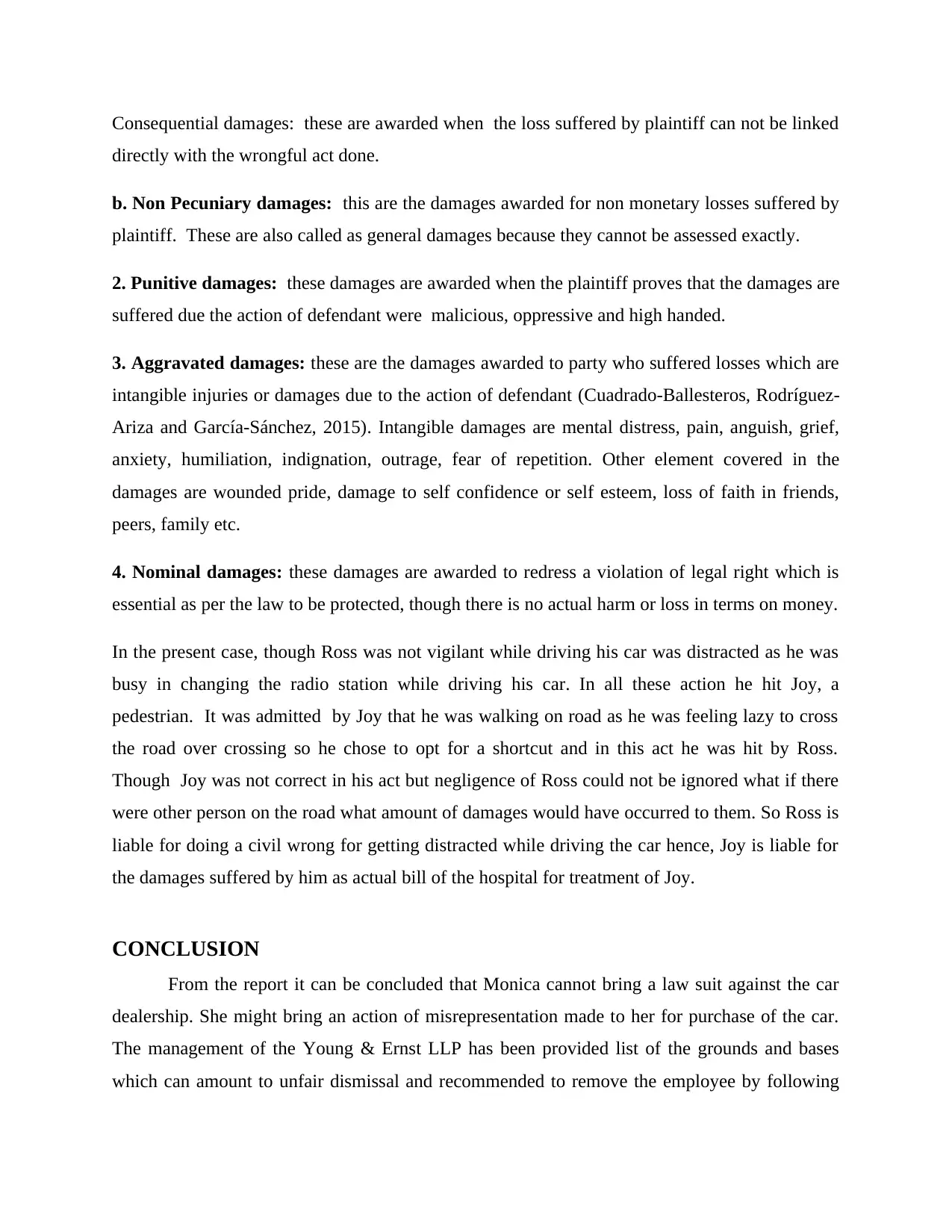
Consequential damages: these are awarded when the loss suffered by plaintiff can not be linked
directly with the wrongful act done.
b. Non Pecuniary damages: this are the damages awarded for non monetary losses suffered by
plaintiff. These are also called as general damages because they cannot be assessed exactly.
2. Punitive damages: these damages are awarded when the plaintiff proves that the damages are
suffered due the action of defendant were malicious, oppressive and high handed.
3. Aggravated damages: these are the damages awarded to party who suffered losses which are
intangible injuries or damages due to the action of defendant (Cuadrado-Ballesteros, Rodríguez-
Ariza and García-Sánchez, 2015). Intangible damages are mental distress, pain, anguish, grief,
anxiety, humiliation, indignation, outrage, fear of repetition. Other element covered in the
damages are wounded pride, damage to self confidence or self esteem, loss of faith in friends,
peers, family etc.
4. Nominal damages: these damages are awarded to redress a violation of legal right which is
essential as per the law to be protected, though there is no actual harm or loss in terms on money.
In the present case, though Ross was not vigilant while driving his car was distracted as he was
busy in changing the radio station while driving his car. In all these action he hit Joy, a
pedestrian. It was admitted by Joy that he was walking on road as he was feeling lazy to cross
the road over crossing so he chose to opt for a shortcut and in this act he was hit by Ross.
Though Joy was not correct in his act but negligence of Ross could not be ignored what if there
were other person on the road what amount of damages would have occurred to them. So Ross is
liable for doing a civil wrong for getting distracted while driving the car hence, Joy is liable for
the damages suffered by him as actual bill of the hospital for treatment of Joy.
CONCLUSION
From the report it can be concluded that Monica cannot bring a law suit against the car
dealership. She might bring an action of misrepresentation made to her for purchase of the car.
The management of the Young & Ernst LLP has been provided list of the grounds and bases
which can amount to unfair dismissal and recommended to remove the employee by following
directly with the wrongful act done.
b. Non Pecuniary damages: this are the damages awarded for non monetary losses suffered by
plaintiff. These are also called as general damages because they cannot be assessed exactly.
2. Punitive damages: these damages are awarded when the plaintiff proves that the damages are
suffered due the action of defendant were malicious, oppressive and high handed.
3. Aggravated damages: these are the damages awarded to party who suffered losses which are
intangible injuries or damages due to the action of defendant (Cuadrado-Ballesteros, Rodríguez-
Ariza and García-Sánchez, 2015). Intangible damages are mental distress, pain, anguish, grief,
anxiety, humiliation, indignation, outrage, fear of repetition. Other element covered in the
damages are wounded pride, damage to self confidence or self esteem, loss of faith in friends,
peers, family etc.
4. Nominal damages: these damages are awarded to redress a violation of legal right which is
essential as per the law to be protected, though there is no actual harm or loss in terms on money.
In the present case, though Ross was not vigilant while driving his car was distracted as he was
busy in changing the radio station while driving his car. In all these action he hit Joy, a
pedestrian. It was admitted by Joy that he was walking on road as he was feeling lazy to cross
the road over crossing so he chose to opt for a shortcut and in this act he was hit by Ross.
Though Joy was not correct in his act but negligence of Ross could not be ignored what if there
were other person on the road what amount of damages would have occurred to them. So Ross is
liable for doing a civil wrong for getting distracted while driving the car hence, Joy is liable for
the damages suffered by him as actual bill of the hospital for treatment of Joy.
CONCLUSION
From the report it can be concluded that Monica cannot bring a law suit against the car
dealership. She might bring an action of misrepresentation made to her for purchase of the car.
The management of the Young & Ernst LLP has been provided list of the grounds and bases
which can amount to unfair dismissal and recommended to remove the employee by following

fair and legal procedure. Further, the new appointed directors of the firm have been represented
list of all the duties and responsibilities they must abide by in their professional capacity. In the
lase question of the report principles have been defined related with how damages can be award
under law of Tort and the manner in which damages can be limited.
list of all the duties and responsibilities they must abide by in their professional capacity. In the
lase question of the report principles have been defined related with how damages can be award
under law of Tort and the manner in which damages can be limited.
⊘ This is a preview!⊘
Do you want full access?
Subscribe today to unlock all pages.

Trusted by 1+ million students worldwide
1 out of 13
Related Documents
Your All-in-One AI-Powered Toolkit for Academic Success.
+13062052269
info@desklib.com
Available 24*7 on WhatsApp / Email
![[object Object]](/_next/static/media/star-bottom.7253800d.svg)
Unlock your academic potential
Copyright © 2020–2025 A2Z Services. All Rights Reserved. Developed and managed by ZUCOL.





